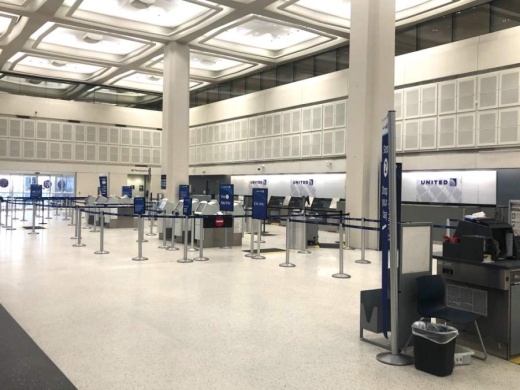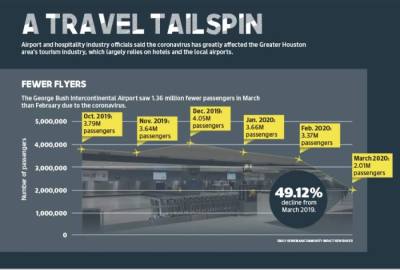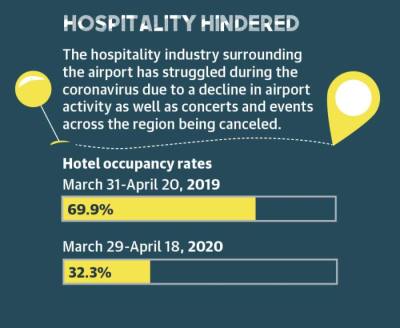Stay-at-home orders as well as travel advisories and restrictions in place amid the pandemic caused passenger travel to decrease by about 50% at George Bush Intercontinental Airport in March 2020 as compared to March 2019, according to data from the Houston Airport System.
IAH saw a decrease of 1.36 million passengers between February and March, from 3.37 million to 2 million, per HAS data. The airport also took a nearly 49.13% decline in March passengers from the same time last year; 3.95 million passengers traveled through the airport in March 2019.
“The reduction in passenger traffic not only affects airfare. It also cuts into our concessionaires and rental car companies that lose business,” HAS Public Information Officer Augusto Bernal said via email.
Through funding made available by the city of Houston as well as the Coronavirus Aid, Relief, and Economic Security Act signed into law March 27, the HAS—which has about 1,100 employees—and the hospitality industry are working to stay afloat.
Financial help
The financial distress airports are experiencing will be mitigated in part by multimillion-dollar grants both IAH and the William B. Hobby Airport in southeast Houston are set to receive from the CARES Act.The U.S. Department of Transportation granted $149.19 million to IAH, $50.87 million to Hobby and $157,000 to Ellington Airport, which is a noncommercial airport also operated by HAS. The grant funds will be used for general operations and debt service at IAH and Hobby, Bernal said.
“The money received from the CARES Act is a replacement of what we would have received so that the airports continue business and remain operational,” he said.
Additionally, Houston City Council unanimously approved a measure April 15 allowing certain payments to the airport system from airlines, rental car companies and concessionaires, such as airport restaurants and shops, to be deferred until June 30. The agreement also waived certain concession and rental car company payments until Dec. 31, 2021.
However, with the airport system receiving funds from the CARES Act, there is a possibility deferred concession and rental car payments could be waived by the Federal Aviation Administration, according to the city of Houston agreement.
Houston City Council Member Jerry Davis, whose district includes the airport, said at the April 15 meeting he was glad the city was able to come to an agreement.
“If we don’t have that travel to our city, we’re going to suffer even more with jobs,” Davis said.
While the long-term effects of the virus on the airport system are not yet clear, Bernal said HAS is ready to meet the community’s travel needs.
Hotel economy
The hotel industry has also been affected by the decline of passengers at Houston-area airports.Hotels in Harris County had an average occupancy rate of 23.2% between March 29-April 18, according to data from STR, a hospitality industry analytics company. Compared to a similar data range in 2019, when Harris County hotels averaged a 66.9% occupancy, this represents a decrease of 43.7% from year to year.
Moreover, STR data shows the IAH submarket, which includes two Humble-area ZIP codes, dropped from an average occupancy of 69.9% to 32.3% in the same time period.
Staybridge Suites IAH Airport East, which is in the airport submarket, has seen a significant decline in guests since the coronavirus hit the region, General Manager Donald Thorsen said. He said his new hotel was estimated to have an almost 50% occupancy in March, as the hotel just opened in late January in Humble.
Instead, the hotel dipped to a 27% occupancy rate in March—and Thorsen said he expects the month of April to be even lower. In April, Thorsen said his 106-room hotel had only 10-20 rooms occupied daily.
“We were just starting to ramp up, and then the coronavirus hit,” he said. “It’s been a struggle to keep open because of this.”
The hotel’s demographic includes mostly airport travelers as well as guests attending events at the nearby Humble Civic Center, which closed in mid-March due to county and state restrictions on public gatherings.
However, Thorsen said the hotel received a Paycheck Protection Program loan from the U.S. Small Business Administration, which has helped the hotel hire back several employees and stay open during the pandemic.
Jan Freitag, senior vice president of STR, said while hotel occupancy globally is “dismal,” there may be hope on the horizon for the U.S. The country’s hotel occupancy rate has not yet dropped below 10% as China’s did at a similar point in their coronavirus response, Freitag said.
“What gives us hope is that it hasn’t happened yet, and we would have expected it to [drop below 10%] by now,” he said. “It is possible there’s a certain base of demand that seems to not go away: airline crews, people in transition or in between houses [and] first responders.”








